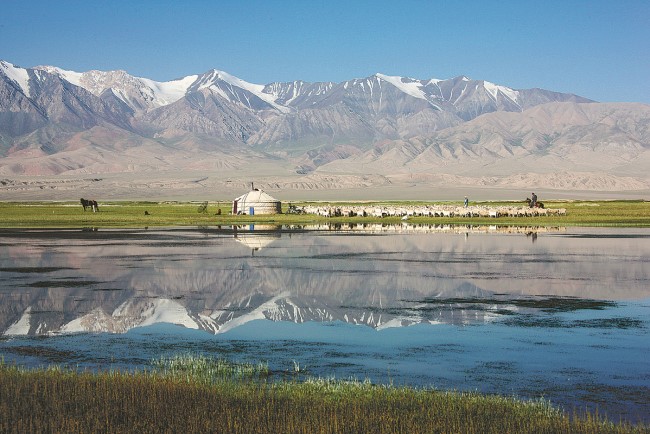Life for Gansu herders improves with environmental efforts

Mongolian nomads herd sheep across pasturelands in Subei county, Gansu province. [Photo/China Daily]
As he herds his sheep to pasture at 6 am each day, 47-year-old Tuanjie never fails to notice how the environment in his hometown-Yanchiwan township in Gansu's Subei Mongolian autonomous county-is improving, and along with it, his life.
An ethnic Mongolian, Tuanjie and his wife raise about 300 sheep. Expenses and money for forage aside, the family earns about 150,000 yuan ($22,300) a year, a sum Tuanjie could not have imagined 20 years ago. "In the past, uncontrolled mining and grazing resulted in a poor environment and desertification in many areas, affecting the number and quality of cattle and sheep we could keep," he said.
Since the government has begun to attach greater importance to environmental protection and teach the herdsmen to take better care of the grassland, the environment has improved greatly over the past decade.
"Cleaner water and better grass mean our cattle and sheep grow more healthily and increase our incomes," he said.
"My wife and I live in a village where every household has water, electricity, internet and concrete roads, and every resident is covered for healthcare and social security. Compared to the past, conditions are better and incomes are higher. My son will graduate from college this year, and what I care about most now is what job he'll find."
Subei county, which is home to nine main ethnic groups, borders the Xinjiang Uygur autonomous region to the west, Qinghai province to the south and Mongolia to the north, and it is the largest county in Gansu province. After years of effort on re-greening, the county is becoming increasingly environmentally friendly.
Its natural grasslands cover about 3.12 million hectares, and it's home to a range of environments, including alpine grassland and wetland, as well as glacier and river ecosystems. As of last year, the county's vegetation coverage had risen to 45 percent, up from a previous low of 25 percent. Plant coverage in drought-hit areas has greatly improved, and the area affected by pests has been decreased by 200,000 hectares.
"We are exploring more avenues of ecological development for different grasslands, such as meadows and desert grasslands, which are essential to improving environmental development," said Wang Zhiming, head of Subei county's grassland station.
Wang said that the creation of a grassland ecology is a long and systematic process. Subei has worked extensively on its natural landscapes, undertaken comprehensive re-greening and continued to re-wild former farmland and grazing land, creating new forests and grassland to consolidate its ecological foundations.
"The improvements in the environment are tangible. Many rare wild animals, such as the snow leopard and the Tibetan fox, have reappeared in the grasslands and mountains," Wang said.
Since 2011, Subei has banned grazing in certain areas and has created a balance between grasslands and livestock via subsidies and incentives amounting to about 960 million yuan, benefiting more than 2,300 families.
Cao Chenhao, deputy head of Subei, said that the county has been strict about giving the environment priority and pursuing green development in recent years, and has stepped up environmental governance.
"We have put a definitive end to damage as the result of new development. Through a number of measures, significant strides have been made in pollution prevention and control, and the environment has been greatly improved," he said.
According to the county government, since 2016, Subei has invested 149 million yuan in the restoration and treatment of its 85 mining areas and the unowned mines in nature reserves, which cover an area of some 625 hectares.
Cao added that over the past three years, air quality has steadily improved, standard groundwater quality now rates 100 percent, 95 percent of industrial and mining wastewater is recycled, and illegal activities such as unauthorized mining and construction have been curtailed to protect natural resources. "We are also actively promoting the integration of ecotourism and Mongolian folk culture to create the sense of a beautiful environment," he said.
According to the county government, Subei has made use of its rare natural resources and traditional folk customs to build tourism brands and help residents get involved in the sector. Income from tourism has brought in 1.9 billion yuan over the past five years.
-
As AI encounters Dunhuang's art, the ancient caisson ceiling bridges centuries to the present.
View all stories

 Gansu thrives from green development
Gansu thrives from green development  >
>